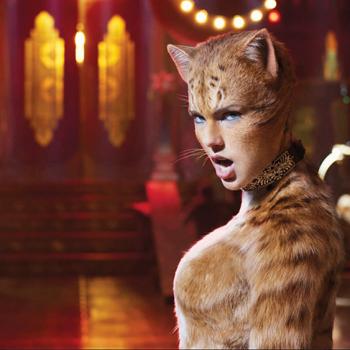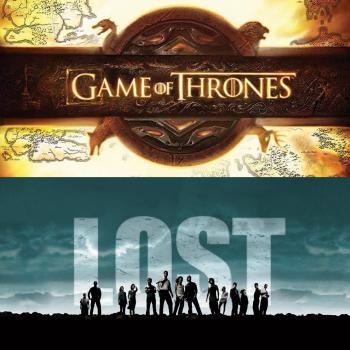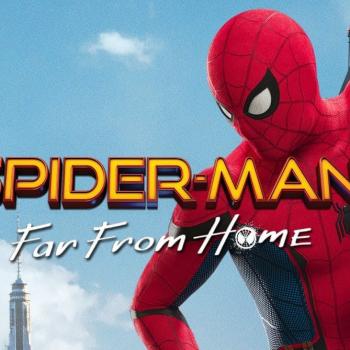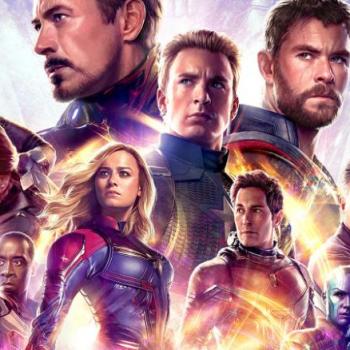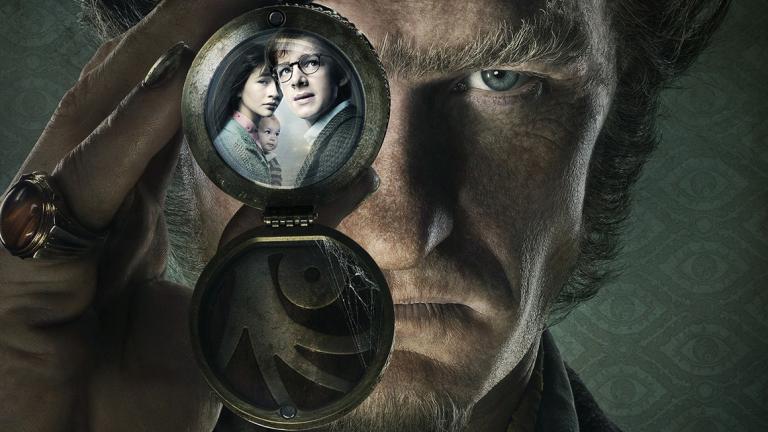
The following contains spoilers for the entirety of A Series of Unfortunate Events.
Dear Reader,
By now you may have heard of Lemony Snicket’s A Series of Unfortunate Events which is both a popular series of thirteen dreadful novels and a television series inexplicably hosted on Netflix. The word “inexplicably” here meaning that “Netflix saw an opportunity to cash in on a popular series of thirteen dreadful novels.”
Written by Daniel Handler, the man behind “Lemony Snicket,” each book begins with a warning to the reader to run away and pick up any other book at all, rather than follow the titular unfortunate events of the Baudelaire orphans. Employing a distinctive narrative style, poorly plagiarized here, the novels enjoyed considerable success in the early aughts. In 2004, the first three novels were crammed together for a theatrical release starring Jim Carrey in the role of Count Olaf. Unfortunately, that movie tanked, and it seemed that any future film adaptations were unlikely.
However, last year, Netflix partnered with the director of the 2004 movie, Executive Producer Barry Sonnenfeld (Men in Black, Pushing Daisies) to bring the entire series to the streaming platform. Featuring Neil Patrick Harris (How I Met Your Mother) as Count Olaf, the first season was well-received and the second season, covering the middle five novels, was released over Easter weekend.
While some parents may have reservations about allowing their children to watch the movies – there are some grippingly scary sections, and the TV series lightly normalizes some romantic situations that a parent might want to monitor – I want to take a moment to draw attention to something the Netflix TV series does really, really right.
Which isn’t unfortunate at all.
Where Have All the Mothers Gone?
One of the tropes of YA literature is that, in order to have children be the protagonists of their own stories, the mother has to die.
It makes sense. Generally speaking, in reality, half the shenanigans everyone from Harry Potter to Hansel and Gretel get into simply wouldn’t happen if their mom was around. Much of YA requires either dead or absent parents – from Cinderella, to Jane and Michael Banks. Along with that, then, comes the requirement that whatever adult does step in must either send the children on adventure (Fairy Godmothers, Mary Poppins), behave as the antagonist (wicked stepmothers, murderous uncles), or be conveniently absent when everything goes down (Dumbledore).
Essentially, YA literature depends upon the incompetence of adults: a theme that A Series of Unfortunate Events, the novels, plays with.
The book series highlights the incompetency of adults – from Mr. Poe’s inability to recognize Count Olaf, to Aunt Josephine and Hector’s being ruled by fear, Phil’s unhelpful optimism, and even the local newspaper’s inability to get any story right. Adults who are competent and good tend to be murdered, such as Uncle Monty and Jacques Snicket, or incapable of helping, such as the narrator and pseudonymous author, Lemony Snicket. Although several of Count Olaf’s hench persons also perish throughout the series, and Olaf’s schemes are thwarted at the end of each book, nevertheless Olaf and his crew tend to be the only adults throughout the series with a level of competency.
While parents might grow alarmed at the lack of any upstanding adult figures in the novels, Snicket’s handling of the failures of adults is important. Rather than merely being a plot device, such as the way Harry Potter sidelines Dumbledore so that Harry can save the day, the dangers and failures of adulthood is part of the point of A Series of Unfortunate Events.
The adults who fail the children don’t do so out of innate evil, but out of that very everyday banality that allows us to, say, elect a sexual predator to office under the guise of making America great again, or turn a blind eye to racism with the limp refrain that all lives matter, or any of the various tribal mantras that we entrench ourselves in as adults because we’re simply tired of searching for the truth.
In the books, the children may have lost their mother, but they keep their moral code. Something we, as adults, should remember.
Holding Out For A Hero
What’s exciting about the Netflix series, then, is that in expanding each book to a two hour movie, the writers – under the direction of Daniel Handler himself – have been able to introduce to A Series of Unfortunate Events a missing character in YA literature: that is, the Heroic Adult.
Like The Hunger Games franchise, A Series of Unfortunate Events is written almost exclusively from the point of view of the protagonists – Katniss Everdeen and the Baudelaire orphans respectively. This technique can raise the tension while reading the novel, since both Katniss and the Baudelaires are constantly caught off-guard by the moves of their antagonists. However, this can also be limiting – such as when the action moves away from Katniss in the third novel, so that the reader is sidelined from the plot along with the protagonist.
In adapting both franchises, the writers expanded the world by removing this limited point of view and allowing the audience to peer behind the curtain. To watch the gamemaster at play in The Hunger Games, and to follow Count Olaf and his associates while they scheme behind the scenes in A Series of Unfortunate Events.
The result, at least for the latter, is that while some of the mystery is removed (such as how Count Olaf finds the Baudelaires time and again), what’s also removed is the sense of chaos that pervaded the novels. Because we can see the actions of Count Olaf, the world seems less haphazard and nihilistic. It also helps that Neil Patrick Harris, one of our preeminent entertainers, manages to play Olaf as alternatively sinister and silly – releasing some of the tension for younger viewers.
But even more exciting is that simultaneous to Count Olaf’s scheming, the writers have allowed us to see members of the “noble VFD” who are working tirelessly to make the world and our children safe. Series One cleverly introduced “Mother” and “Father” whom viewers were encouraged to suspect were the Baudelaire’s parents, still alive after all, breaking out of jails and flying planes from Peru to reach their three children. Their true identities are revealed at the end of the series, just before their own tragic demise, but it’s enough to know that there are virtuous and competent adults who care for all children in this world…even if our heroes will never know them.
The first series also introduced an entirely new character, another “Volunteer,” Jacqueline: a woman posing as Mr. Poe’s secretary, and who manages not only to survive, but to give a little hope and help to the Baudelaire children directly. Larry Your-Waiter, a character mentioned as a passing joke in the excellent Lemony Snicket: The Unauthorized Autobiography, now makes a helpful appearance in The Wide Window as a quick thinking waiter who assists the Baudelaires, and in Series Two assists Jacqueline in bringing the dashing Jacques Snicket onto the case to help our heroes out.
Casting Nathan Fillion in full swagger and noir patter as Jacques Snicket is a coup, and it’s delightful to see Harris and Fillion go at it again as villain and hero after Dr. Horrible’s Sing-Along Blog. Jacques, a character who appears only briefly in the novel of The Vile Village, here gets a full series arc. Although he still falls prey to Olaf’s murderous intent, it’s not before he does his best to remind Olaf that the villain once believed in something noble, too – and could again.
Similarly, the role of Olivia Caliban, aka “Madame Lulu” from The Carnivorous Carnival is here recast entirely. Whereas in the book she was just another unhelpful adult – a “Volunteer” who at first sheltered the Baudelaires and then betrayed them – in the Netflix series Olivia is introduced as the kindly librarian in The Austere Academy who, in attempting to help the orphans, crosses paths with Jacques. They have a brief and sweet romance, which is cut short when they part ways on separate missions. Jacques is murdered, but Olivia carries on, covering for the Baudelaires when they arrive at the carnival – and then even giving her life for them by the end of the episode.
With such a drastic change, the once nihilistic-lite message of the novels is altered – and for the better.
For where the novels were full of missed connections, unhelpful adults, and the vagaries of fortune, the TV series comes down firmly on the side that even when the world seems worst, there is someone unseen and unsung who’s looking out for you.
A Moral Compass
While there are some artistic and even moral quibbles I have with both the novels and the Netflix series, there’s one aspect that’s particularly commendable in both, and well worth the watching for.
While quite a bit of modern YA falls prey to both killing off parents and therefore forcing the protagonists into some morally grey decision-making to say the least, not every YA novel actually deals with the philosophic repercussions of having to make such terrible choices at such a young age. The better books do have some reflection to a degree: The Hunger Games questions whether Katniss is doing the right thing by using Peeta’s affections for her to manipulate the viewers and keep both of them alive. Harry Potter shows some degree of angst and caution once Sirius Black dies (a little too late in the series for my taste, but at least it comes up).
In A Series of Unfortunate Events, around the time of The Hostile Hospital, the Baudelaire children stop passively going from one incompetent guardian to another, and instead take charge of their own fates. They decide to deceive a literally short-sighted, but kind-hearted man, Hal, in order to gain important information. They disguise themselves like Count Olaf had done in order to fool Count Olaf himself. And in the upcoming The Slippery Slope, the entire crux of the novel is the question of whether the Baudelaire’s successful actions – which so closely mirror Count Olaf’s own – and which they did in order to survive in a world that includes Count Olaf – are turning them into villains themselves.
No fifty points for Gryffindor.
No: A Series of Unfortunate Events has always been clear-eyed that it’s a short path between villain and hero, sinner and saint.
In our own world where it’s easier to put ourselves in a Facebook echo chamber, to refuse to see Count Olaf when he’s dressed up in clothes that look like ours, it’s important that all good and noble people shake themselves out of their stupor and start searching for the truth.
As Lemony Snicket might say:
It’s time to Volunteer.
 Image courtesy of Netflix 2018.
Image courtesy of Netflix 2018.
Want to support Emily? You can become a patron for as little as $1/month on Patreon! Help choose what the Pop Feminist reviews next.







